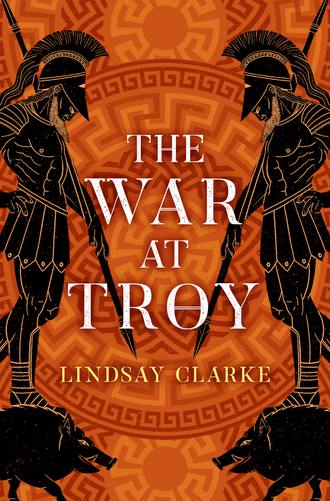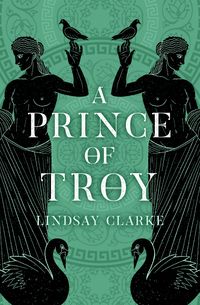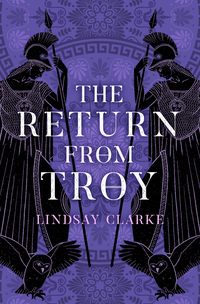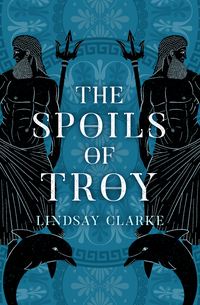
Полная версия
The War at Troy
Odysseus and Nestor immediately commended the merits of the plan. When Diomedes declared that he had no objection to sharing that part of his command, Agamemnon gave the scheme his general approval so long as the details could be worked out to his satisfaction. But though the conflict between Agamemnon and Achilles had been contained, it had not been resolved, and Odysseus came away from the council privately convinced that, whatever the oracles promised, the hostility between the High King and the dangerous young man he had brought out of Skyros might one day prove disastrous for the whole campaign.
Whenever Odysseus spoke about Achilles in later years he would always claim that there was a mystery about the youth that baffled understanding, for though his pride was impossible, his murderous efficiency as a warrior was matched by a degree of tenderness such as Odysseus had observed in no other man. In some respects, he suggested once, Achilles had more in common with Helen than with anyone else he knew. They had both grown up loving wild things in wild places – Achilles at Cheiron’s school in the mountains, Helen in the wilderness groves of Artemis – and both had a certain feral quality about them, by which I think he meant an almost amoral air of innocence that was capable of ruthless action. It’s true also that both of them had been injured by the human world at a crucial moment of their development and their destinies were shaped for ever by those wounds. Above all, however, they seemed kindred in the knowledge that though their bodies were mortal, their spirits were not, and everything about them seemed touched by immortal fire.
‘Mother,’ Achilles had said at last as he and Thetis parted, ‘I was born to die soon, but Olympian Zeus owes me some honour for it.’ And so he had come to the war, convinced that he would never return, and driven by so urgent an appetite for his destiny that he would let nothing stand in the way of his honour. Out of forces that once threatened to tear him apart – the bitter strife between his mother and his father, between the old religion and the new, between the claims of his peaceful life on Skyros and his need for glory – Achilles had forged himself into a weapon of war, and his whole being gleamed with warlike purpose.
This then was the young man entrusted with the leadership of the surprise assault on Tenedos, and his bristling new resolve to prove himself something more than a man among men generated such a degree of impetus that his small band of Myrmidons crashed into the rear of the Trojan defenders with terrifying ferocity. The cliff heights were taken with few losses, a signal was sent to Diomedes telling him to bring his ships ashore, and the raiding party advanced so far ahead of the main force that it was Achilles himself who thrust his spear through the breast of King Tenes, the commander of the island force, and then killed the man’s father with a savage blow to the head.
Thereafter resistance quickly collapsed. Splashed with blood that was none of his own, his bright hair gleaming in the dawn light, Achilles stood among his cheering men, waiting for Diomedes to join him in the citadel. However soon his death might come, he felt certain now that his name at least would never die.
Once the bridgehead on Tenedos was established, Agamemnon decided to send ambassadors to Troy offering terms for the withdrawal of his forces. Menelaus, Odysseus and Palamedes were chosen to present demands which – it was clear to all of them before they set out – Priam must find unacceptable. The true purpose of the mission was to discover just how united the Trojans were behind their outward show of defiance, and with that intention in mind, Agamemnon’s herald Talthybius had arranged for the envoys to be lodged in the house of Antenor while in the city.
They found the king’s chief counsellor cagey and reserved at first, and far from at ease with the knowledge that he was responsible for their safety in a city filled with their enemies. Over a few goblets of wine, however, and at the subtle prompting of Palamedes, it was natural enough for Menelaus and Antenor to share some hard feelings about Paris, the man whom each saw as the destroyer of his happiness. Meanwhile, Odysseus worked his wry charm on Antenor’s wife Theano, who needed little encouragement to express her undying hatred for the man who had killed her child and now threatened ruin on Troy.
For the first time the Argives began to gather a picture of the way events had unfolded in the city since Paris had left Sparta with his prize. They learned that Aeneas had lent his support to Paris during the flight from Sparta only because they were sworn friends committed to each other’s aid, and not because he approved in any way of Paris’s treacherous behaviour. He and his father Anchises had soon made it plain that the High King must not look to Dardania for help when the hosts of Argos came battering at his gates. According to Antenor, Priam had tried to make light of this rift with his cousin, saying that until his son returned, and he had heard the whole story directly from his lips, he would reserve judgement on the matter. Privately, however, the king’s mind was already bent on war. He had known that it must come sooner or later, and was as ready for it as he would ever be. Antenor even remarked on a certain gleefulness in Priam’s usually grave features when he considered the scale of the insult that his son had given to Argive pride.
But Priam had been forced to wait for several months before the Aphrodite returned to Troy, for Paris and Helen had sailed as far east as Cyprus in the hope of eluding all pursuit. Menelaus winced to learn that his wife and her lover had indeed been concealed on the island while he was there, and had sailed southwards into Egypt shortly after his departure. The weather was good at that time and the seas calm, so after making his devotions at the birthplace of Aphrodite, Paris had turned their flight into a prolonged voyage of love. He had calculated that a delay in his return would allow time for his father and brothers to accept what had been done and come to terms with it. Perhaps it might also whet the appetite of the Trojans for the fabled beauty of his abducted lover.
In that last respect, his calculations had certainly hit the mark, for as soon as the Aphrodite was seen approaching the city, a large crowd began to gather along the road from the harbour to the Scaean Gate, while yet others lined the streets. To further heighten the excitement and the air of mystery, Paris arranged for Helen and Aethra to be carried in curtained litters, so that they could pass from the ship to the palace without being exposed to the mob’s coarse stare. They would have heard a few bawdy jeers from the back of the crowd, but they must also have sensed how the rich procession of retainers, slaves, animals and trophies was received for the most part with an exhilarated awe intensified by further expectation. Behind those gauzy curtains lay Helen of Sparta, who had now become, to the city’s undying glory, Helen of Troy. It was as though a goddess had descended among them, one whose mystery must not be profaned. And Paris, the people’s own prince – the bull-boy from the pastures of Mount Ida – could be seen riding proudly beside her litter. Who could argue when a beggar shouted that the age of wonders was come again upon the earth?
Antenor told how Helen’s face had still been veiled when Paris finally brought his lady before the full assembly of Priam’s family and counsellors in the great hall of the palace. ‘It was a little like watching a sculptor presenting his master work,’ he commented drily, aware of the pain on the face of Menelaus, whose sensitive imagination made him feel all the more a cuckold with each new fact he learned. ‘We had waited for so long to see her that the entire hall was agog. And yes, I have to admit that Helen is a woman of astonishing beauty – though whether any woman is worth putting an army at risk is, in my opinion, quite another matter.’
‘Or a city,’ Palamedes said.
‘Indeed.’
‘Yet we are all reasonable men. Our enmity is with Paris not with Troy. It would be a great tragedy if thousands were to die for one man’s selfish folly. Don’t you agree?’
Aware that he was answering other questions than the one that had been put to him, Antenor said, ‘Believe me, if my wife and I could see a way of avoiding war by delivering him over to you, Paris would return with you in chains this very night. But the High King is as smitten with Helen’s beauty as he is indulgent of his son. And the war party on his council is stronger than those of us who would prefer a peaceful solution. So do not expect Priam to look with favour on any demands for Helen’s return.’
When the Argive envoys presented themselves before Priam the following day, they found the atmosphere in the great hall even more openly hostile than they had expected. Paris himself was absent from the council, and Antenor did what he could to ensure a fair hearing for Agamemnon’s ambassadors, but he could not prevent the gasps and jeers of outrage with which Deiphobus and Antiphus greeted their catalogue of demands. These included the immediate return of Helen, the surrender of Paris to answer charges of murder and abduction, the compensation of Menelaus for the injury he had received, the compensation of Agamemnon and Idomeneus and all the princes under their command for the massive expense to which they had been driven by Paris’s actions, the establishing of well-defended Argive settlements in strategic locations on the Asian mainland, and free, unrestricted access to the Hellespont, the Black Sea and all the major trade routes with the east and north.
The monetary demands alone would have been sufficient to ruin Priam many times over, but the King of Troy heard Odysseus out, stony-faced, before silencing his noisier sons with a raised hand, and giving his response.
‘As to the first point, we are hardly to blame if our royal cousin of Sparta failed to satisfy his wife. Unlike my sister Hesione, who has languished in captivity on Salamis for many years, the Lady Helen is here in Troy of her own free will. If it was her wish to leave, I would regard it as beneath my dignity to keep her here. Let the princes of Argos learn a simple lesson of courtesy in that respect.’ Aware of the angry flush across the scarred face of Menelaus, he drew in his breath. ‘As to your other demands, we have long been aware that the High King at Mycenae covets our wealth and power. And why should he not when his own domain is a mere hovel by comparison? Our message to him is also simple. Nothing awaits him in Troy but ruin and humiliation. Let him clear our waters of the infestation of his ships and take his pack of Argives home before all their wives find husbands better suited to their taste.’
Remembering the last time he had stood before Priam in this hall and the amicable manner in which they had parted, Menelaus found it hard to contain his fury. ‘I see that your son lacks the courage to look me in the eye,’ he said. ‘If all your followers are as brave, King Priam, look to have your women raped, your city burned and pillaged, and your line extinguished. I will have my wife again. And you – you will rue the day that Paris shuddered from your loins.’
Odysseus put a restraining hand to his friend’s arm, and then he turned to face Priam with a cool, disdainful stare. ‘We will deliver your message to our king,’ he said. ‘Look to have his answer soon.’
The Argive ambassadors withdrew stiffly from the hall and returned to the house of Antenor. Not till long after they had left the city did they come to learn that, if Deiphobus and Antiphus had been given their way, the three of them might have been murdered in their beds that night. Only Antenor’s outraged protests, fortified by Hector’s sense of honour, had kept them from the crime.
The first assault on Troy turned into a brutal and inconclusive clash which left both sides damaged and thoughtful.
Things began well enough for the Argives when a night raid with blazing torches caused havoc among Priam’s fleet, seriously weakening his ability to guard against invasion. But the same raid had warned the Trojans of the imminence of attack and by the time Agamemnon’s ships approached the shore, a well-positioned army stood waiting to repel them.
To make matters worse, the Argive troops were troubled by rumours of a prophecy that the first man ashore was doomed to die. Even Achilles hesitated at the prow of his ship, reluctant to throw away his life with so little glory gained. Meanwhile the Trojans hurled rocks and stones at the crowded ships, keeping up an unnerving ululation that carried on the harsh wind blowing across the plain.
At last, stung by the insults coming from the enemy before him and from Agamemnon at his back, an old warrior called Iolaus who had once been charioteer to Heracles, gave a mighty shout and jumped into the surf. He was immediately surrounded and cut down on the strand before he could strike a single blow, but the man’s rash courage was to win him undying fame. He was given the title Protesilaus – ‘first to the fight’ – and buried with great honour that night on the Thracian shore of the Hellespont.
But now that the first life had been lost, other warriors began to jump from the ships. Achilles and Patroclus were among the leaders, with Phoenix and the Myrmidons behind them. Odysseus, however, held back a while, watching how the battle developed. He had counselled against launching a land attack until more had been done to stretch Priam’s resources, but Agamemnon had been so infuriated by the king’s insolent reply to his terms that he was determined to force the words back down his throat. Now the price of his impatience swiftly came clear as more and more men fell under the volley of arrows that met them as they stumbled towards the shore.
By sheer force of numbers, the Argives forced a landing, only to find themselves embroiled in a fierce and bloody struggle all along the strand. The strongest resistance came from a sector of the front where a Trojan hero called Cycnus hacked his way through the invaders as if he was invulnerable. When Achilles saw what was happening, he shouted for Patroclus to follow and fought his way across the uneven ground until he confronted the Trojan giant. Cycnus laughed in his face, gesturing for the youth to come at him if he dared. A moment later he was astonished by the speed and ferocity of Achilles’ attack. Even so, the fight was long and desperate, and might have gone either way had not Cycnus stumbled over a stone as he sought to avoid a sword thrust. He fell to the ground on his back, pulling Achilles down with him. Both men lost their weapons in the fall, but Cycnus was winded by the weight of his opponent’s armoured body. In a frenzy of violence, Achilles grabbed at the Trojan’s throat and strangled the man with his own helmet straps.
When he stood up, gasping and exultant from the kill, it was to feel Patroclus pulling at his arm. All around him, as a trumpet sounded from Agamemnon’s flagship, he saw the Argive warriors retreating from the shore.
Many recriminations followed the failure of that first attack, but the heavy losses he had taken persuaded Agamemnon that Odysseus had been right to insist that Troy would fall only after a long campaign of attrition. So the war entered a new, sullen phase of sporadic violence that dragged on for a year, and then another, until it became clear that, if Troy ever fell, it would not be until all the long years of the snake had passed.
Battles were fought at sea, and many ships were sunk, and many men burned and drowned before the Argives established their naval superiority. From their stronghold on Tenedos, they were now free to mount raids all along the Asian coastline. The island of Lesbos was taken, and mainland cities smaller than Troy fell before them. Priam’s southern allies in Lydia suffered heavily from these attacks. Colophon, Clazomenae, Smyrna and Antandrus were all left looted and burning, but other important cities such as Sestos and Abydos on either side of the Hellespont held out under siege. So the years of warfare protracted themselves from season to bloody season, and all across Asia, from the Black Sea to Cyprus, even in places far from where the Argives had ever landed, the name of Achilles struck fear in men’s hearts and kept children from their sleep.
There were also long periods of inactivity while both sides licked their wounds, or when fever, dysentery and pestilence robbed men of the will to walk let alone fight. Sometimes the troops could not be stirred in the torrid summer heat, and the dark winter months were always wretched and bitter. A maddening wind blew across the Trojan plain throughout much of the year but in winter there was ice on its breath. It left the springs frozen, the tents heavy with snow, and battle-hardened warriors groaning over chilblains and frostbite. And even when the weather was clement not a day went by without men questioning why they had ever got into this insane fight and wondering whether they would ever sit by their homeland hearths again. But those who deserted faced a long trek home through hostile territory and most of the Argives grudgingly decided that having endured so much, it made no sense to turn for home with little to show for their pains but wounds and stories. So the war went on.
In the ninth year, with Troy’s western sea lanes cut, and many of her allies demoralized by constant raids, it began to look as though the war was finally moving Agamemnon’s way. Late in the summer he decided to attack Mysia.
The Mysians are a Thracian people who had crossed from Europe a century earlier. Their king, Telephus, was a bastard son of Heracles who had gained the Mysian throne with Priam’s help after marrying one of the High King’s many daughters. His fertile lands were now keeping Troy supplied with wheat, olives, figs and wine that were carried along inland routes beyond the reach of raiders. Agamemnon had been convinced by Odysseus that if Mysia fell, then Troy might be starved into submission. So leaving behind him a force strong enough to hold Tenedos, he brought the bulk of his fleet to the island of Lesbos and used the harbour at Mytilene as a base for his assault on that part of Mysia around the mouth of the river Caicus which is called Teuthrania. But once again he miscalculated the strength of the resistance and the battle took much the same shape as his failed advance on Troy many years earlier. The landing was made more quickly this time but the Mysians had the advantage of the ground and by the time Agamemnon had seen half of his advance guard cut down, he was struggling to avoid a rout among his troops.
Конец ознакомительного фрагмента.
Текст предоставлен ООО «ЛитРес».
Прочитайте эту книгу целиком, купив полную легальную версию на ЛитРес.
Безопасно оплатить книгу можно банковской картой Visa, MasterCard, Maestro, со счета мобильного телефона, с платежного терминала, в салоне МТС или Связной, через PayPal, WebMoney, Яндекс.Деньги, QIWI Кошелек, бонусными картами или другим удобным Вам способом.





